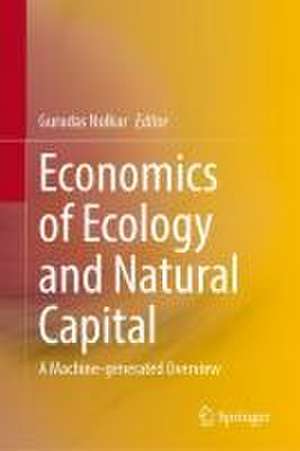The intersection of Economics and Ecology: A Machine-generated Literature Overview
Editat de Gurudas Nulkaren Limba Engleză Hardback – 10 ian 2025
This book is a machine-generated literature overview highlighting the importance of natural capital while studying the economics of ecology. It puts together available literature on this theme exploring it through the lens of sustainable development. While the main content is machine-generated, each chapter contains curated published content overview and an introduction by the editor, highlighting important areas and literature gaps, describing the connection of the topic with human economy, and examples of negative externalities. The topics seek out research articles that show a connection with mainstream economy, or rural livelihoods.
The connection between natural capital and human economy, is well-known, but many of these negative externalities are complex problems to solve. While there is a growing awareness to capture the value of natural capital in economic decision-making, there is no universal consensus. However, assessing the economic value of naturalresources and ecosystem services, and integrating this information into decision-making processes such as cost-benefit analysis, corporate reporting, and government policy-making, holds a promise of finding long-term solutions to these market failures. By valuing natural capital, decision-makers can better understand the economic benefits and costs of different activities and policies, and make more informed choices that balance economic, social, and environmental objectives.
Containing important introductions by the human editor to plug gaps in literature, the book is a great resource for policy-makers, students of economics and sustainable development, non-governmental organisations working in this field, and corporate managers who are responsible for allotting budgets towards corporate social responsibility programs.
Preț: 905.06 lei
Preț vechi: 1103.73 lei
-18% Nou
Puncte Express: 1358
Preț estimativ în valută:
173.22€ • 180.14$ • 144.95£
173.22€ • 180.14$ • 144.95£
Carte tipărită la comandă
Livrare economică 15-29 martie
Preluare comenzi: 021 569.72.76
Specificații
ISBN-13: 9789819968923
ISBN-10: 9819968925
Ilustrații: XVI, 464 p. 1 illus. in color.
Dimensiuni: 155 x 235 mm
Greutate: 0.85 kg
Ediția:2024
Editura: Springer Nature Singapore
Colecția Springer
Locul publicării:Singapore, Singapore
ISBN-10: 9819968925
Ilustrații: XVI, 464 p. 1 illus. in color.
Dimensiuni: 155 x 235 mm
Greutate: 0.85 kg
Ediția:2024
Editura: Springer Nature Singapore
Colecția Springer
Locul publicării:Singapore, Singapore
Cuprins
Natural Capital.- Water Resources.- Biodiversity.- Ecosystem services.- Integrating Natural Capital in the Economy.
Notă biografică
Professor Gurudas Nulkar is Professor and Director of the Centre for Sustainable Development at the Gokhale Institute of Politics and Economics, Pune, India. He teaches undergraduate and graduate students, supervises PhD students, and is engaged in empirical and applied research in the field of ecological economics and sustainable development. He has an experience of 19 years working in the industry, after which he shifted to academia where he has been teaching for the last 13 years. His doctoral research was in environmental sustainability within industrial ecosystems. This was followed by Post-doctoral Endeavour Fellowship of the Government of Australia. He has published four books, of which three are in Marathi language and one in English. His Marathi book "Anartha Shashtra" has received the Maharashtra State Literature Award in the category “C.D.Deshmukh Award for Economic Literature”. His papers have been published in reputed journals and as research reports. Prof. Nulkar hasserved as an expert on several committees and panels, including UN-ESCAP program, Government of Maharashtra, and Pune Divisional Commissioner’s Office. He contributed to the Pune Metropolitan Region Development Authority Draft Plan as an ecological expert. He is a member of Pune International Centre, Energy, Environment and Climate Change, and a member of the Indian Society for Ecological Economics (INSEE). He has completed several projects funded by organisations such as World Resources Institute, Global Forest Watch, Centre for Environmental Education, UNICEF, and others.
Textul de pe ultima copertă
This book is a machine-generated literature overview highlighting the importance of natural capital while studying the economics of ecology. It puts together available literature on this theme exploring it through the lens of sustainable development. While the main content is machine-generated, each chapter contains curated published content overview and an introduction by the editor, highlighting important areas and literature gaps, describing the connection of the topic with human economy, and examples of negative externalities. The topics seek out research articles that show a connection with mainstream economy, or rural livelihoods.
The connection between natural capital and human economy, is well-known, but many of these negative externalities are complex problems to solve. While there is a growing awareness to capture the value of natural capital in economic decision-making, there is no universal consensus. However, assessing the economic value of natural resources and ecosystem services, and integrating this information into decision-making processes such as cost-benefit analysis, corporate reporting, and government policy-making, holds a promise of finding long-term solutions to these market failures. By valuing natural capital, decision-makers can better understand the economic benefits and costs of different activities and policies, and make more informed choices that balance economic, social, and environmental objectives.
Containing important introductions by the human editor to plug gaps in literature, the book is a great resource for policy-makers, students of economics and sustainable development, non-governmental organisations working in this field, and corporate managers who are responsible for allotting budgets towards corporate social responsibility programs.
Containing important introductions by the human editor to plug gaps in literature, the book is a great resource for policy-makers, students of economics and sustainable development, non-governmental organisations working in this field, and corporate managers who are responsible for allotting budgets towards corporate social responsibility programs.
Caracteristici
A machine-generated literature overview that connects economic growth with ecological integrity Explores biodiversity and market mechanisms for valuing ecosystem services Highlights the critical connections between natural capital, human economy and sustainable development
